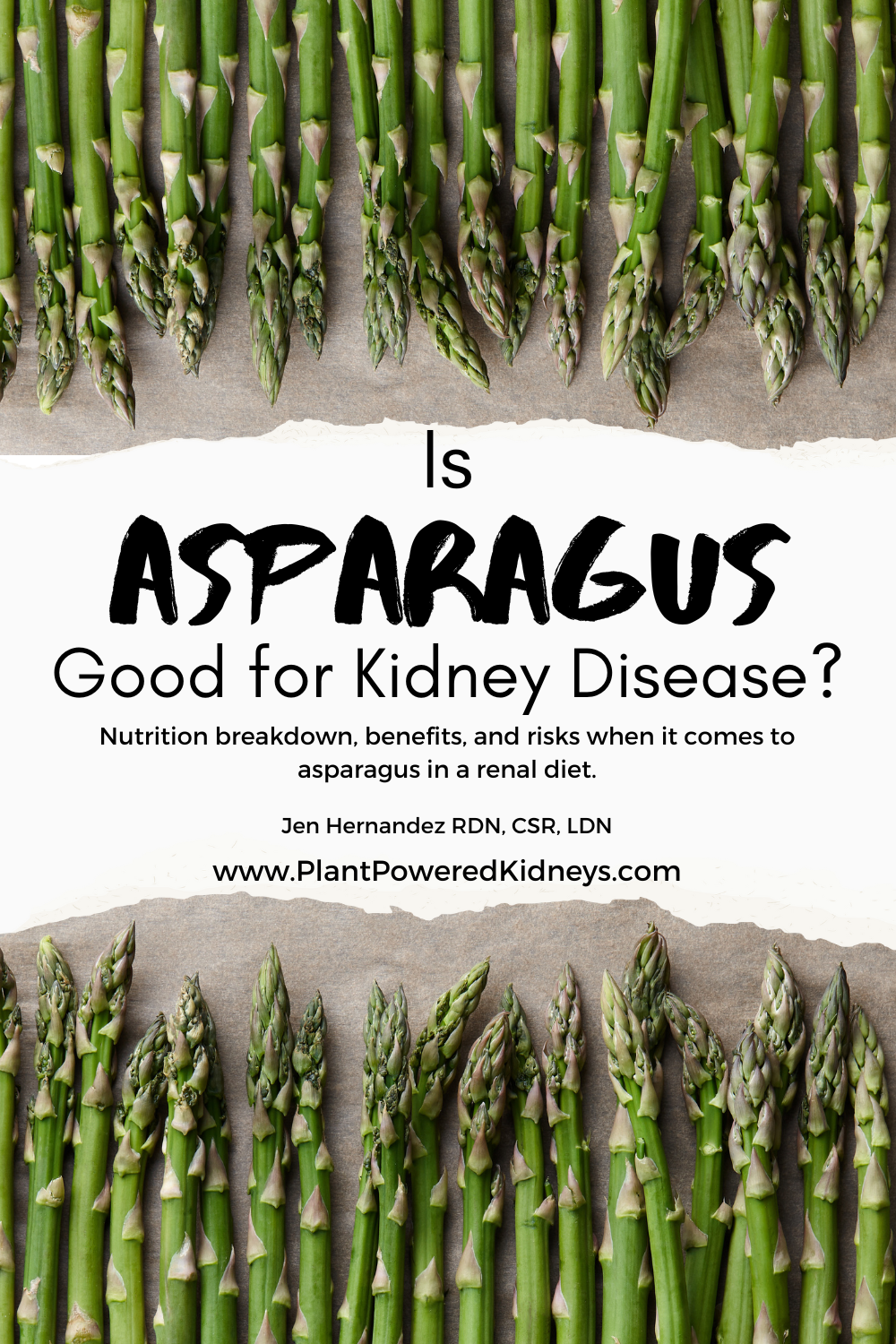While easily recognized and commonly known, many with chronic kidney disease wonder “is asparagus good for kidney disease?” In this article, we’re going to cover the nutritional value of asparagus, the potential benefits and risks of asparagus in a renal diet, and how to include it to protect kidney health.

Table of Contents
History of Asparagus
Asparagus originated in the eastern Mediterranean countries. It’s been used for over 2000 years for culinary and medicinal purposes.
There are many types of asparagus. In fact, there are over 300 species.
Asparagus officinales is the most common is the type of asparagus found in the grocery store. It can be found in green, white, and purple colors.
The medical type of asparagus is known as Asparagus racemosa (or shatavari). This type is most commonly grown in Asia.
It is what is typically used in supplements and known in ayurvedic or Eastern medicine.
Asparagus Nutrition Facts
Asparagus has a great nutrition profile. One-half cup (67 grams) fresh asparagus contains:
- 14 calories
- 3 g carbohydrates
- 1.5 g fiber
- 1 g protein
- 135 mg potassium
- 1 mg iron
- 35 mg phosphorus
- 4 mg vitamin C
- 28 µg vitamin K
The same amount of canned asparagus (in grams) has similar nutritional value, though may be high in sodium.
Asparagus contains a variety of other micronutrients in small amounts, making it a nutrient powerhouse.
A 1/2 cup serving is low in potassium.
This makes asparagus something that can fit into almost anyone’s renal diet. (If they want to include it!)
In fact, we include it in our popular Renal Diet Grocery List.
Asparagus Season
Asparagus is typically in season from late February through June. However, it’s generally available in grocery stores year-round.
A pound of fresh asparagus will cost as low as $1-2 per pound when in season. During the off-season, it can be closer to $4-6+ per pound.
One pound of fresh asparagus will provide 4-6 half-cup servings. This means a side of this vegetable can cost as little as $0.16 per serving while in season.
Canned asparagus is also available year-round, but actually may be more expensive during peak season when fresh asparagus is readily available.
Benefits of Asparagus
Asparagus has long been highlighted for its benefits related to its nutritional value. Here, we will review the benefits of asparagus in a renal diet.
Antioxidant-Rich
Antioxidants are often found in fruits and vegetables, and asparagus is not an exception.
Purple asparagus contains a large amount of anthocyanins. This is how it keeps a deeper purple color.
Other antioxidants in asparagus include vitamins C and E, glutathione, and rutin. However, these can be lost with excessive cooking.
Digestive Health
The fiber content of asparagus makes it a very gut-friendly food. The soluble and insoluble fiber content of asparagus helps to feed and support a healthy gut.
Asparagus also contains prebiotics. Prebiotics is a type of fiber that feeds bacteria in the gut.
A healthy gut is very important to kidney health.
Our digestive tract breaks down and absorbs food and nutrients. These are then moved into the bloodstream, which is filtered by the kidneys.
Potential Benefits of Asparagus
There is some promising research that has come out about the benefits of asparagus. These potential benefits can also be connected to supporting kidney health.
It’s important to stress that these have not yet been proven effective in humans. These would need to be studied further before being touted as a true benefit due to limited research.
Blood Pressure Control
Asparagus has the potential to support good blood pressure. Rich in the flavonoid quercetin. Quercetin is linked to potentially improving blood pressure.
A study on rats showed that the rats on an asparagus diet had lower blood pressure compared to the rats on a regular diet.
However, it’s important to note that animal studies do not always equate to human results.
High blood pressure is one of the top causes of chronic kidney disease. Kidneys can stay health by focusing on healthy blood pressure.
Blood Sugar Control
A study on type 2 diabetic rats showed lower blood sugar levels when given asparagus extract.
There is promising research related to the prebiotics found in asparagus and improvements in blood sugar.
Diabetes is another top cause of chronic kidney disease. In fact, a renal diabetic diet is a common type of nutrition plan recommended to help care for both diabetes and chronic kidney disease.
Learn more about a renal diabetic diet here.
Improved Mood
Some studies have seen improvements in mood with Asparagus racemosus supplementation.
Potential benefits include; less stress, anxiety, depression, epilepsy, Parkinson’s, and Alzheimer’s disease.
Many patients with kidney disease have reported having a higher risk of developing mood and mental illnesses.
Discussing mental health with a provider and seeking professional help for mental health related to chronic illnesses like chronic kidney disease can be incredibly powerful.
Slow Kidney Stones
A study looking at a small group of rats found that certain supplemental doses of Asparagus racemosus reduced the formation of kidney stones.
The study was also short at only 10 days. However, they found the rats with the supplement had lower amounts of serum calcium, phosphorus, urea, and creatinine.
If kidney stones are a problem, here are 10 tips to naturally prevent kidney stones.
Risks of Asparagus
While there are benefits to adding asparagus to a renal diet, there are some things to consider.
Blood Thinning Effect
Asparagus contains a good amount of vitamin K. While this is typically good, it may be a challenge for someone on blood thinning medication.
If your doctor has talked with you about vitamin K in your diet, make sure you discuss what is safe.
It’s likely that these situations require consistent blood draws to measure vitamin K levels.
In these cases, adding small amounts and tracking labs is possible.
Diuretic Effect
Many people with kidney disease look to diuretics to help with chronic illness. Asparagus has been known for having diuretic properties.
The majority of the diuretic effect is found in the root of asparagus.
Those with kidney stones may have heard that asparagus helps to eliminate stones. There is even a “Coke Treatment” online.
This idea encourages large amounts of regular Coca-Cola with a large amount of steamed asparagus liquid. This method, however, has been disproven.
Research has stated that asparagus is not a comparable solution when compared to medications.
Asparagus Extract Supplements
Asparagus extract, or shatavari, is most commonly used for female reproductive and hormone disorders.
It’s important to note that asparagus supplements will not contain gut-healthy fiber.
Are asparagus extract supplements safe for people with kidney disease?
The jury is still out.
As with many nutrition studies geared explicitly toward kidney disease, the research is just not there yet.
It’s best to discuss your goals and safety with your own physician before starting an asparagus extract supplement.
Adding Asparagus to The Renal Diet
If you or someone you love has kidney disease, you may be wondering how you can add this nutritional vegetable to a renal diet.
Clean and Prep
Asparagus is very easy to add to the renal diet. To prep asparagus, wash well under water for a few minutes or until there is no visible dirt.
Trim the tough bottoms off of the asparagus before cooking. These ends are very fibrous and difficult to chew. Simply snap an asparagus spear where it naturally breaks.
Line the trimmed spear up with the rest of the asparagus and cut at that same area. Now you have asparagus that is ready to be used!
Meal Ideas
Here are some of our favorite ways to make asparagus good for kidney disease:
Roast
Roasting vegetables is a great way to keep nutrients in and create a crispy yet soft texture.
To roast asparagus, simply toss in a little olive oil or avocado oil. Sprinkle a little salt and pepper, along with some garlic powder. Line on a baking sheet prepped with parchment paper.
Roast at 400F for 10-20 minutes or until done to your liking.
Peel & Serve
Did you know you can eat raw asparagus? This works very well for both green and purple asparagus.
One of the significant benefits of eating asparagus raw is that the antioxidants, vitamins, and minerals will all be consumed.
Simply hold the asparagus at the tough root end. Peel with a vegetable peeler towards the green “leafy” tip.
Take the peeled asparagus and toss it into a salad or even with some cooked spaghetti pasta. It adds a lovely color and texture to a meal.
So is asparagus good for kidney disease?
Long story short – yes and no. The nutritional benefits of kidney disease like promoting good gut health with fiber, preventing a wide range of diseases with antioxidants, and providing heart-healthy potassium are some of the reasons to start.
Some of the claimed benefits like blood pressure control and blood sugar control still require human trials to determine the benefits that have only been studied in animals thus far.
Asparagus (just like any other food) is not a fix-all. Starting a diet with only asparagus will not support good kidney health. In fact, too much may cause problems such as too much vitamin K.
The best approach to include asparagus with kidney disease is similar to most foods – enjoy it in moderation. Try adding it as a roasted veggie side, shaving it into a salad or rice pilaf, or grilling at your next cookout.



Hi! How can I have you as my dietitian? My mother has kidney failure stage 5. We would love to work with you!
Hi Alexander! Our dietitians currently accept patients in the United States, dependent on different state laws that vary. To learn more and apply to work with one of our dietitians, click here. Seats are based on first come, first served and availability is limited. If you do not see any times available, check back in 1-2 weeks or join our email list to be notified each month.
I cannot find a Stage 4 kidney disease list of foods anywhere. I learn best by lists!
Hi Jayne! Stage 4 will still be different for each person. Even two people with the same stage and cause may have different diet recommendations. You can start with our Renal Diet Grocery List and add/remove foods based on your needs and preferences.